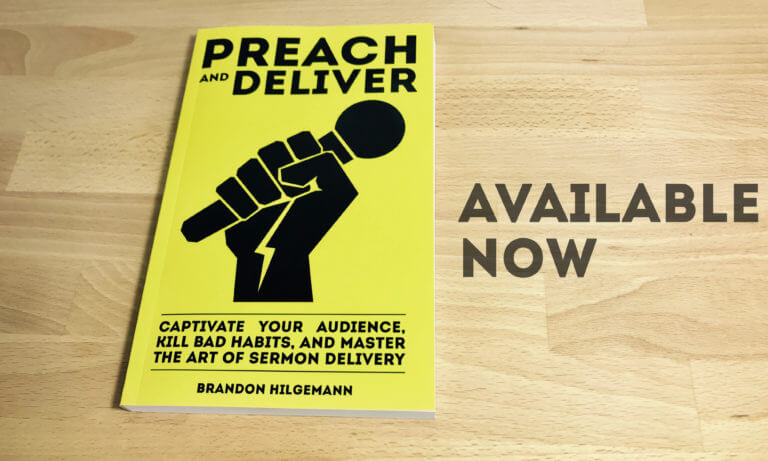The Most Ignored Priority In Preaching Today
The following is a guest post by J.T. Bean, Lead Pastor at Trinity United Methodist Church in Swanton, Ohio. J.T. is part of a unique 12-member team of pastors that oversees seven UMC churches in northwest Ohio. The team website is www.umcteam1.org.

There is one action that has the potential to improve your preaching skills more than anything else. Unfortunately it is totally ignored by most pastors. Can you guess what it is? Here’s a hint: You do it every time you listen to someone else preach. But most preachers rarely put it to use when they themselves occupy the pulpit.
Whether it’s pride, laziness, or feelings of inadequacy, very few pastors recognize the need for “critical critique”. It takes a humble, teachable spirit to submit to even the best designed process of review. But when your sermons are properly critiqued, you employ the most useful instrument in your tool chest of self-improvement.
The reason this isn’t a priority with most pastors is because we don’t like to submit to the cutting edge of criticism…. Ouch! That hurts when you point out to me that my opening joke was a dud…. Ow! That stings when tell me my message was boring…. Yikes! That’s embarrassing when you reveal that my fly was down the entire sermon!
There are many aspects about our preaching that we fail to recognize simply because it is impossible to put ourselves in the pew and become a listener of our own sermon. We may be self-aware enough to admit that we have weaknesses in the pulpit. But often the only way to fix what is wrong, is to be told what needs fixing–and then committing oneself to actually improve. This is done by embracing the process of critical review.
As part of a preaching rotation on my church staff, it requires a strong level of trust that others on the team will consistently bring their A-game when they are assigned to preach. The only way this trust can be secured is through a commitment to weekly sermon review. The team has shamelessly nicknamed our review process: “The Bleeding.” Although it sounds brutal, (ok, sometimes it actually is), the result is a continual sharpening of our team’s preaching skills. The goal is to help everyone to improve and become better communicators.
Although many pastors might say they are open to a review process, my guess is that few give time or effort to making it a priority. The closest most pastors get to an actual review is when they shake hands after a Sunday morning service and a congregant says, “Thanks for that message Pastor. Great job.” Although nice to hear, this is not an actual critique. It is a kind word of appreciation, but does nothing to refine or perfect a pastor’s preaching skills.
The truth is, every sermon has flaws that can be corrected. And as you correct your communication errors you become better at what you do. Consistent improvement only serves to strengthen your effectiveness as a leader. If you’re attitude is “I can’t preach any different or any better than I already do”, you are resigning your position as a leader because leaders should be learners. So how does our team go about critically critiquing each other’s sermons?
1. Be Consistent
Every week we take time in our staff meeting to thoroughly evaluate the sermon in each of our seven churches. The team members that were present to hear the sermon each tell what they perceived as “merits” and “defects” of the message. I can tell you that when it is my turn to preach, I make a greater effort to prepare and practice my sermon than I ever have before because I do not want to receive a bad review. Consistent critique provides accountability. Not unlike a contestant on “American Idol”, I know I am being judged so I do my best to preach a powerful sermon.
2. Be Comprehensive
This means that we critique everything about the sermon. A sermon is more than just content. It is also a presentation. Here are examples of things that we have been known to critique:
- Pronunciation
- Wardrobe
- Transitions
- Illustrations
- Sermon title
- Gestures
- Facial Expression
- Eye Contact
- Microphone problems
- Volume. Too loud or too soft?
- Pace. Too fast or too slow?
- Powerpoint. Enhanced the message or distracted?
- Humor. Did people laugh at your joke? Why or why not?
- Length. Was the sermon was too long? Too short?
Truly, there is nothing that is beyond critique. When you submit to a comprehensive review, you never know what will be scavenged from your sermon for discussion. Rather than being nit-picky, a thorough review provides specific information that is actually helpful (as opposed to the limited benefit of a handshake and a “Nice sermon” comment from a parishioner on his way out the door). You have to develop a thick skin to be reviewed this way. It takes some getting used to, but if this next critique element, is present, you will have a much easier time enduring the review process.
3. Be Cooperative
This means that you trust one another to share honestly and openly, without taking the critique as personal attack. It must be viewed as an attempt to sharpen one another. A preacher only gets better by learning from his or her mistakes. But you have to have an honest discussion about what mistakes are being made and how to correct them. This is the essence of “cooperative” critique. If you believe your team is on your side and there to help you win, then you will be perfectly willing to humble yourself and receive an honest critique without fear or trembling.
Summary
However you choose to analyze your weekly messages, I encourage you to make the effort. Don’t fall into the “I can’t preach any other way” trap. You are never too old to change. And you’re never too good to be beyond help. Leaders are learners. And when you commit to function with an attitude of continual development, your congregation benefits from your increased level of skills. And of course, so do you.




Excellent article, and wonderful suggestion not only for those that stand in the pulpit each week, but for any leader. Thank you for your candor and insight.
Yep. This applies to worship leaders, Sunday school teachers, etc. We all have dull edges to be sharpened. Critical critique should be embraced and not feared.